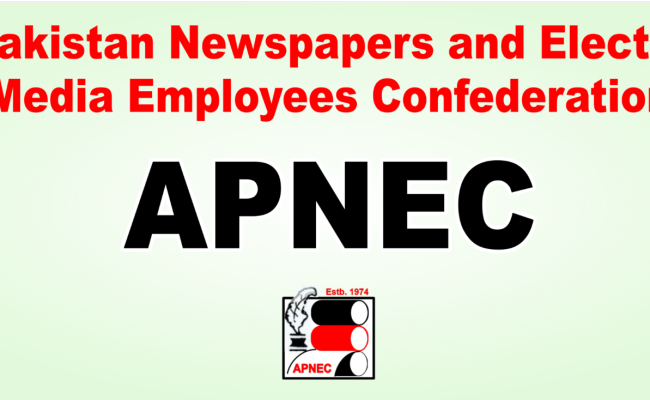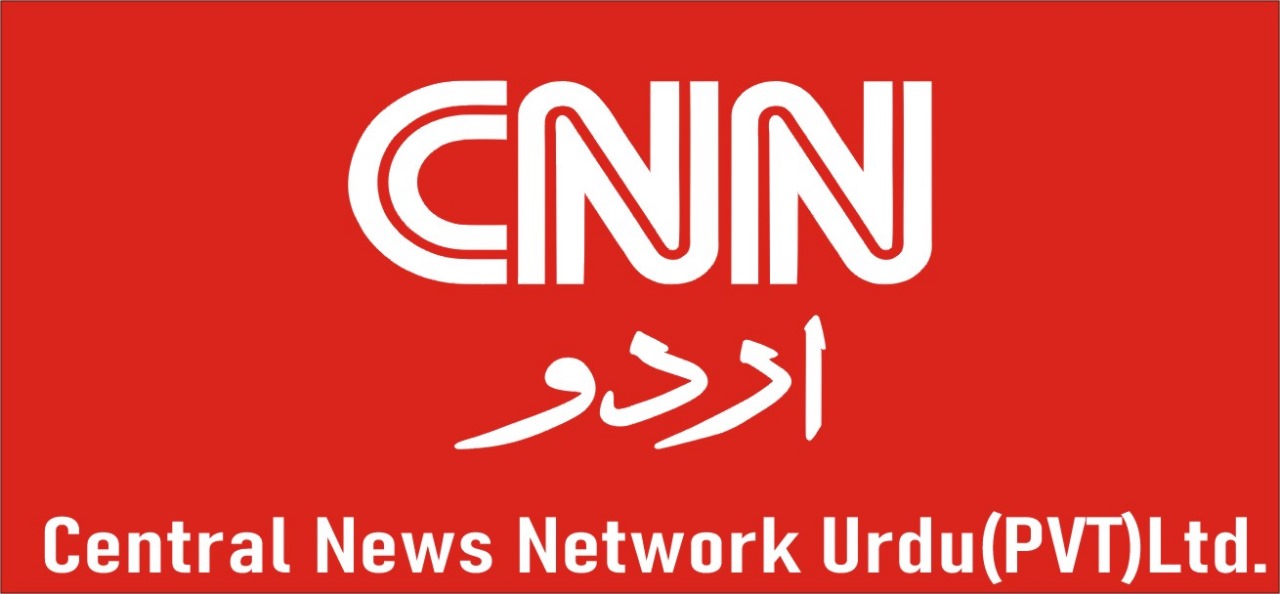Research By: Abid Siddique Chaudhry
The World Ambassador
________
ISLAMABAD: The All Pakistan Newspapers and Electronic Media Employees Confederation (APNEC) is the largest national union confederation of newspaper workers, electronic media employees, technical staff, circulation staff, production workers, and non-editorial media staff in Pakistan. This organization unites newspaper and electronic media unions across the country and works for employees’ rights, wages, service structure, job security, media freedom, and the implementation of labor laws.
APNEC is the only national confederation in Pakistan that includes workers from both print and electronic media.
Establishment — 1974
APNEC was founded in 1974 to provide a unified national platform for media and newspaper workers across the country. At that time, newspapers were plagued with:
-
Low wages
-
Disorganized service structures
-
Illegal terminations
-
Poor working conditions
In this context, various newspaper unions from different cities agreed to form a national confederation.
Thus, in 1974, the “All Pakistan Newspaper Employees Confederation (APNEC)” was established, which later expanded to include electronic media workers and adopted its present comprehensive name:
All Pakistan Newspapers and Electronic Media Employees Confederation (APNEC)
Historical Background
During the 1960s and 1970s, journalism and media institutions in Pakistan faced government restrictions, censorship, economic pressure, and industrial issues. In that period:
-
Newspaper workers’ wages were unregulated
-
Implementation of labor laws was limited
-
Newspaper unions were suppressed
-
There was no unified national platform for media workers’ rights
The establishment of APNEC in 1974 filled this gap and, for the first time, provided a strong national voice to media workers.
Notable Leaders and Historic Personalities
Minhaj Barna — A renowned journalist and organizational leader who founded APNEC and played a key role in the struggle of journalists’ unions.
Other important leaders: Abdul Hameed Chhapra, Pervaiz Shaukat, Naseer Zaidi, and many more who served in various leadership roles.
Expansion in the New Era — Inclusion of Electronic Media
After 2000, Pakistan saw rapid growth in electronic media (TV channels, news channels, digital platforms). APNEC expanded its structure to include:
-
News channel reporters and technical staff
-
Non-journalist media workers
-
Digital media workforce
-
Field technicians
-
Master control room staff
Thus, APNEC became the representative confederation of all media workers of Pakistan, not just newspaper employees.
Mission and Objectives
APNEC plays a significant role in promoting the rights of media workers by focusing on:
-
Improving working conditions
-
Ensuring fair wages
-
Enhancing service structures
-
Providing overtime, bonuses, and dues
-
Protecting legal rights
-
Struggling for implementation of labor laws
-
Safeguarding press freedom
-
Supporting smaller unions
-
Strengthening negotiation power with media owners and government institutions
Organizational Structure
APNEC is a nationwide federation comprising:
-
Central Chairman
-
Central Secretary General
-
Vice Chairmen / Joint Secretaries
-
Provincial Chairmen
-
Provincial Secretaries General
-
Divisional Unions
-
District Unions
-
Working Committee / Council
Central Leadership (2025–2027)
Central Chairman: Muhammad Siddique Anzar
Muhammad Siddique Anzar is an experienced organizer and labor leader in the media sector. He has been elected as the Central Chairman of APNEC for the second time (two-year term). He is a strong voice for media employees across Pakistan and represents print and electronic media workers nationwide.
He successfully secured a grant of one billion rupees from Prime Minister Shehbaz Sharif for the Prime Minister’s Health Insurance Scheme for Journalists and Media Workers, enabling over 5,000 media employees to receive free medical treatment in top hospitals across Pakistan — a historic service for the media community.
Central Secretary General: Abdul Samad Mengal
Active for workers’ rights across Balochistan and the entire country.
Provincial Leadership
-
Punjab Chairman: Abid Siddique Chaudhry
-
Punjab Secretary General: Sardar Ijaz Khan Shahani
-
Sindh Chairman: M.B. Abbasi
-
Sindh Secretary General: Syed Anwar Alvi
-
Balochistan Chairman: Haider Khan Achakzai
-
Balochistan Secretary General: Yasir Jadoon
-
Gilgit-Baltistan Chairman: Mehvesh Mumtaz Baig
-
Gilgit-Baltistan Secretary General: Wazir Nusrat Ali
-
Khyber Pakhtunkhwa Chairman: Abdul Wadood Baig
-
Khyber Pakhtunkhwa Secretary General: Dr. Nauman
APNEC Punjab — Provincial Chapter
Chairman: Abid Siddique Chaudhry
General Secretary: Ijaz Shahani
Key Achievements:
-
Reorganization of unions across Punjab
-
Strong voice for working-class issues
-
Negotiations with media organizations
-
Strong network in Lahore, Faisalabad, Rawalpindi, Multan, Sialkot, etc.
APNEC’s Struggle (1974–2024)
-
Struggle for implementation of Wage Board Awards
-
Actions against illegal dismissals
-
Participation in movements for press freedom
-
Nationwide representation
-
Recovery of workers’ dues during economic crises
-
Protests against media houses
APNEC’s Role and Importance in Pakistan
-
The largest representative body of media workers
-
United voice of print and electronic media staff
-
Key pillar of the labor movement
-
Active role in legal reforms and media policy-making
Conclusion
For nearly 50 years, APNEC has safeguarded the rights of media workers in Pakistan. It has:
-
Fought for the rights of thousands of employees
-
Organized unions across the country
-
Participated in the struggle for press freedom
-
Provided media workers with a powerful collective platform
APNEC continues to be the strongest voice of media workers in Pakistan.
APNEC’s Major Struggles: Protests, Legal Cases, and Wage Board Awards (1974–2025)
This section highlights APNEC’s historical struggle from a research perspective, especially in relation to labor rights, wage board awards, and legal battles.
1. Wage Board Awards and Legal Struggles
APNEC has consistently fought for wage board awards for media workers. According to IFJ, eight Wage Board Awards have been issued to date.
The 7th Wage Board Award was highly controversial. PFUJ and APNEC jointly demanded that the award be enforced by linking government advertisements to its implementation, pressuring media owners to comply.
In 2008, PFUJ and APNEC demanded the establishment of the 8th Wage Board.
International organizations also noted these struggles. FIDH reported that APNS (representing media owners) avoided implementing wage awards for years, but the court ruled in favor of workers and their unions.
IFJ/IRADA reports also highlight difficulties in enforcing wage board decisions and gaps in providing proper legal and financial protection to newspaper workers.
2. Protests and Demonstrations
APNEC has been active in protests, especially when salaries are delayed or employees are terminated.
In 2012, when implementation of the 7th Wage Board Award was delayed, PFUJ and APNEC observed a Black Day and launched a nationwide protest campaign.
Regional units also played an active role — for example, on 12 November 2024, APNEC Bhakkar Unit was inaugurated, where leadership discussed workers’ welfare, health insurance, and union strengthening.
On 29 December 2024, APNEC held a major meeting in Rawalpindi/Islamabad with national and provincial leadership.
3. Struggle for Digital Media Rights and Legal Reforms
In the modern era, APNEC faces new challenges regarding the legal recognition and protection of digital media workers.
Reports highlight that digital journalists are not adequately protected under outdated laws, such as the Newspaper Employees Act 1973, which only covers print media.
Similarly, implementation of wage board decisions (e.g., 8th award) remains inconsistent.
4. International and Human Rights Dimension
APNEC’s struggle is acknowledged internationally as well. IFJ describes APNEC as a “key defender of fundamental labor rights for journalists.”
FIDH documents APNEC’s legal battles, court strategies, and defense mechanisms in detail.
Analysis and Impact
-
APNEC’s struggle for wage boards has strengthened the legal and financial standing of media workers.
-
Its protests and legal battles have pressured media owners to respect employees’ rights.
-
With the rise of digital media, APNEC’s challenges have increased due to lack of legal protections for modern media workers.
-
APNEC remains active not only at the employment level but also in policy-making and legal reforms.
APNEC Timeline (1974–2025) — Key Events, Protests & Legal Struggles
| Year | Major Events and Struggles |
|---|---|
| 1974 | APNEC founded by uniting local newspaper unions nationwide. |
| 1977–1988 | Active era of Minhaj Barna — a leading face of APNEC and PFUJ. |
| 2003 | APNEC workers staged a sit-in in Karachi, protesting non-implementation of the 7th Wage Board Award. |
| 2006 | APNEC and PFUJ opposed APNS’ proposal of granting only one Eid holiday. |
| 2008 | Media workers protested nationwide after Azam Khan, a private TV employee, committed suicide due to unpaid salary. APNEC + PFUJ demanded the 8th Wage Board. |
| 2011 | Death of Minhaj Barna, APNEC founder and legendary labor leader. |
| 2012 | PFUJ + APNEC protested the 7th Wage Board Award and criticized government payments to APNS. |
| 2018 | Government announced formation of the 8th Wage Board; nationwide protests against layoffs and salary cuts. |
| 2019 | HRCP reported formation of Journalist-Workers Action Committee led by APNEC and others for workers’ dues and rights. |
| 2023 | Govt allocated 1 billion rupees for media workers’ health insurance. |
| 2025 | Nationwide protests by PFUJ + APNEC against amendments to PECA; “Black Day” observed. |
Overall Assessment
The timeline shows APNEC’s evolving struggle — from representing only print media workers to covering electronic and digital media employees. Wage Board Awards have remained a central focus, especially the 7th and 8th awards.
APNEC’s joint struggle with PFUJ has strengthened the labor movement. In the modern era, APNEC is active not only in economic issues but also in legal and policy reforms.


